Law & Legal Systems: Criminal Justice System in the UK
VerifiedAdded on 2022/12/27
|9
|3105
|85
AI Summary
This article provides an overview of the criminal justice system in the UK, including its components and principles. It discusses the role of courts, police, and other organizations in providing justice. The article also highlights the inefficiencies in the system and recommends reforms.
Contribute Materials
Your contribution can guide someone’s learning journey. Share your
documents today.
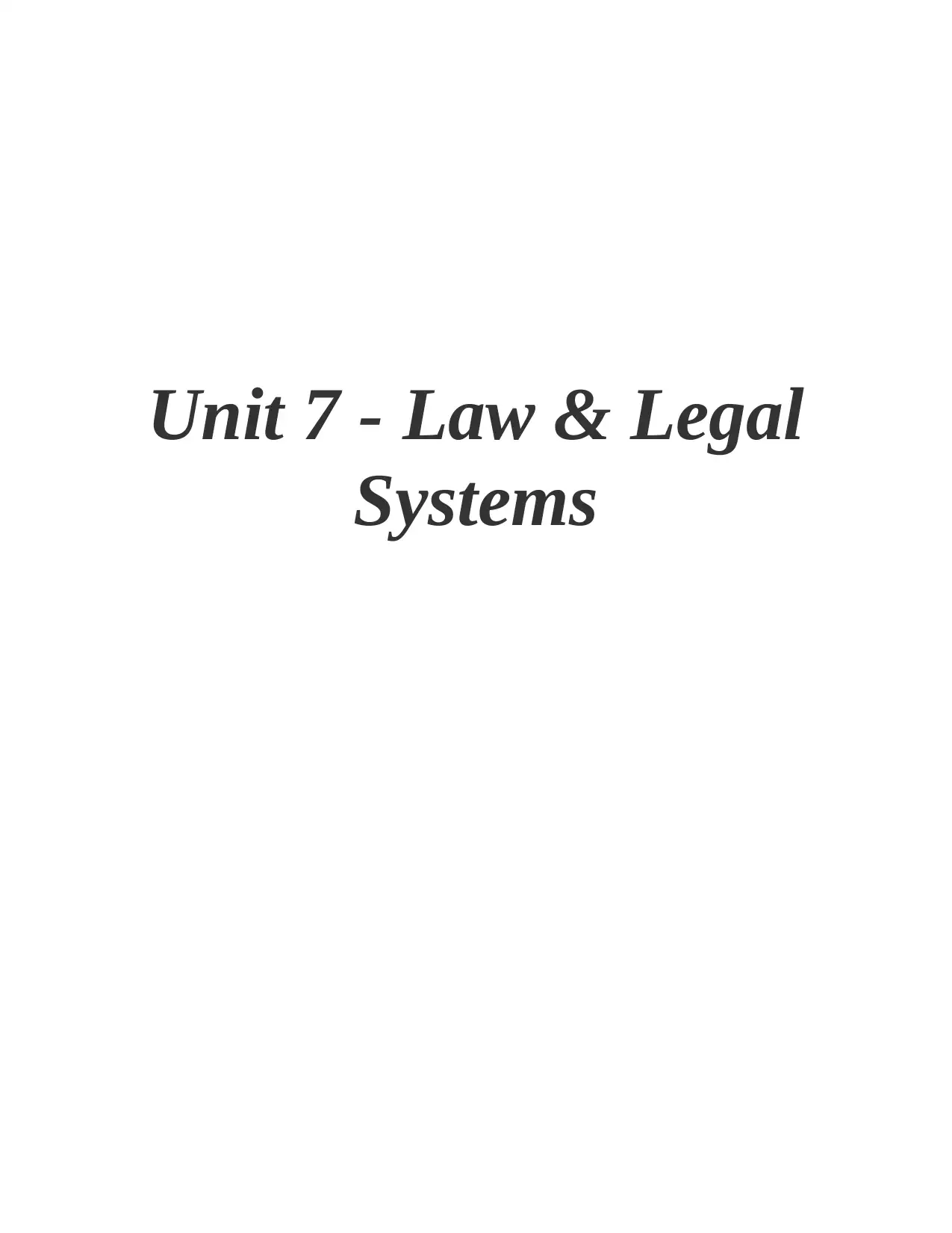
Unit 7 - Law & Legal
Systems
Systems
Secure Best Marks with AI Grader
Need help grading? Try our AI Grader for instant feedback on your assignments.
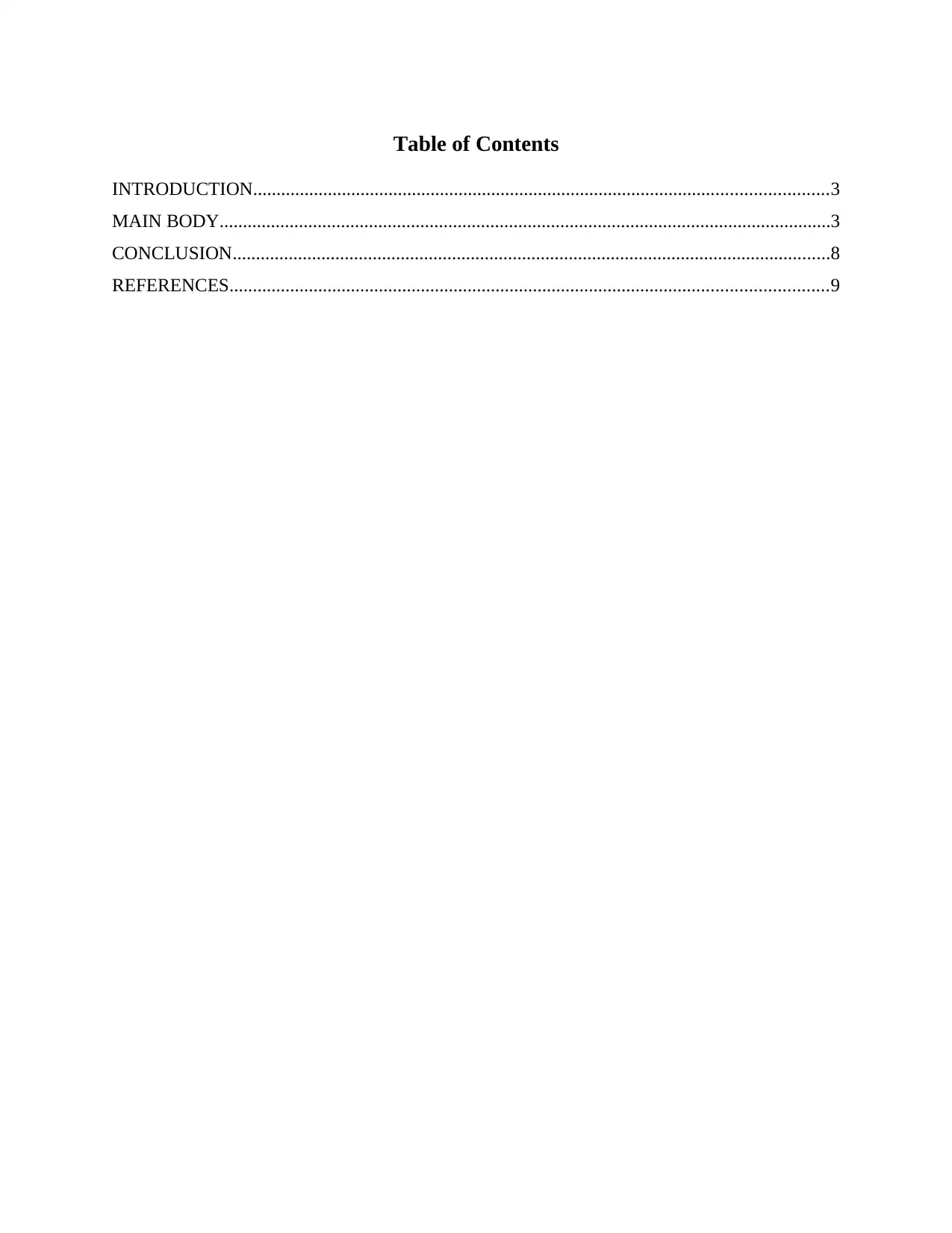
Table of Contents
INTRODUCTION...........................................................................................................................3
MAIN BODY...................................................................................................................................3
CONCLUSION................................................................................................................................8
REFERENCES................................................................................................................................9
INTRODUCTION...........................................................................................................................3
MAIN BODY...................................................................................................................................3
CONCLUSION................................................................................................................................8
REFERENCES................................................................................................................................9
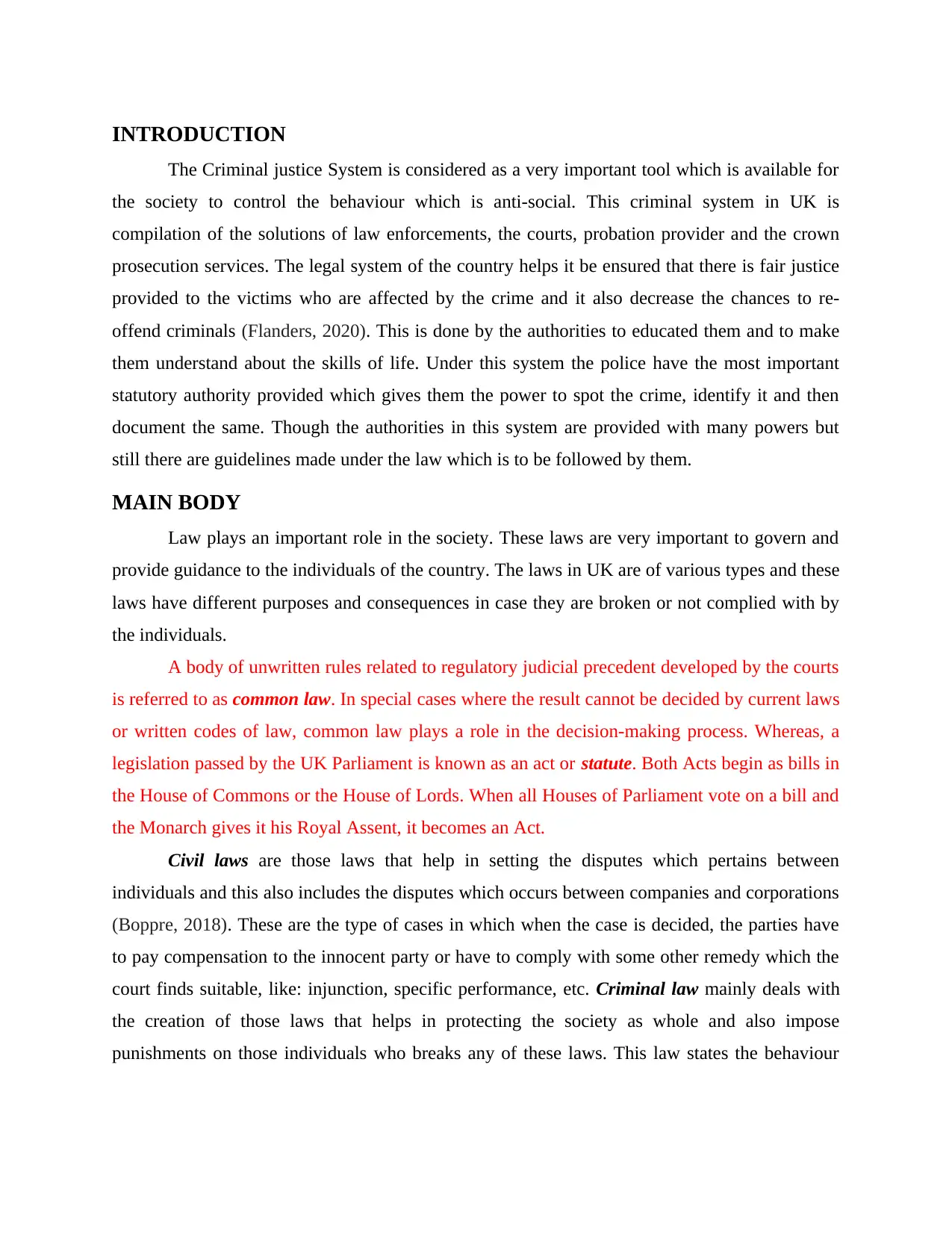
INTRODUCTION
The Criminal justice System is considered as a very important tool which is available for
the society to control the behaviour which is anti-social. This criminal system in UK is
compilation of the solutions of law enforcements, the courts, probation provider and the crown
prosecution services. The legal system of the country helps it be ensured that there is fair justice
provided to the victims who are affected by the crime and it also decrease the chances to re-
offend criminals (Flanders, 2020). This is done by the authorities to educated them and to make
them understand about the skills of life. Under this system the police have the most important
statutory authority provided which gives them the power to spot the crime, identify it and then
document the same. Though the authorities in this system are provided with many powers but
still there are guidelines made under the law which is to be followed by them.
MAIN BODY
Law plays an important role in the society. These laws are very important to govern and
provide guidance to the individuals of the country. The laws in UK are of various types and these
laws have different purposes and consequences in case they are broken or not complied with by
the individuals.
A body of unwritten rules related to regulatory judicial precedent developed by the courts
is referred to as common law. In special cases where the result cannot be decided by current laws
or written codes of law, common law plays a role in the decision-making process. Whereas, a
legislation passed by the UK Parliament is known as an act or statute. Both Acts begin as bills in
the House of Commons or the House of Lords. When all Houses of Parliament vote on a bill and
the Monarch gives it his Royal Assent, it becomes an Act.
Civil laws are those laws that help in setting the disputes which pertains between
individuals and this also includes the disputes which occurs between companies and corporations
(Boppre, 2018). These are the type of cases in which when the case is decided, the parties have
to pay compensation to the innocent party or have to comply with some other remedy which the
court finds suitable, like: injunction, specific performance, etc. Criminal law mainly deals with
the creation of those laws that helps in protecting the society as whole and also impose
punishments on those individuals who breaks any of these laws. This law states the behaviour
The Criminal justice System is considered as a very important tool which is available for
the society to control the behaviour which is anti-social. This criminal system in UK is
compilation of the solutions of law enforcements, the courts, probation provider and the crown
prosecution services. The legal system of the country helps it be ensured that there is fair justice
provided to the victims who are affected by the crime and it also decrease the chances to re-
offend criminals (Flanders, 2020). This is done by the authorities to educated them and to make
them understand about the skills of life. Under this system the police have the most important
statutory authority provided which gives them the power to spot the crime, identify it and then
document the same. Though the authorities in this system are provided with many powers but
still there are guidelines made under the law which is to be followed by them.
MAIN BODY
Law plays an important role in the society. These laws are very important to govern and
provide guidance to the individuals of the country. The laws in UK are of various types and these
laws have different purposes and consequences in case they are broken or not complied with by
the individuals.
A body of unwritten rules related to regulatory judicial precedent developed by the courts
is referred to as common law. In special cases where the result cannot be decided by current laws
or written codes of law, common law plays a role in the decision-making process. Whereas, a
legislation passed by the UK Parliament is known as an act or statute. Both Acts begin as bills in
the House of Commons or the House of Lords. When all Houses of Parliament vote on a bill and
the Monarch gives it his Royal Assent, it becomes an Act.
Civil laws are those laws that help in setting the disputes which pertains between
individuals and this also includes the disputes which occurs between companies and corporations
(Boppre, 2018). These are the type of cases in which when the case is decided, the parties have
to pay compensation to the innocent party or have to comply with some other remedy which the
court finds suitable, like: injunction, specific performance, etc. Criminal law mainly deals with
the creation of those laws that helps in protecting the society as whole and also impose
punishments on those individuals who breaks any of these laws. This law states the behaviour
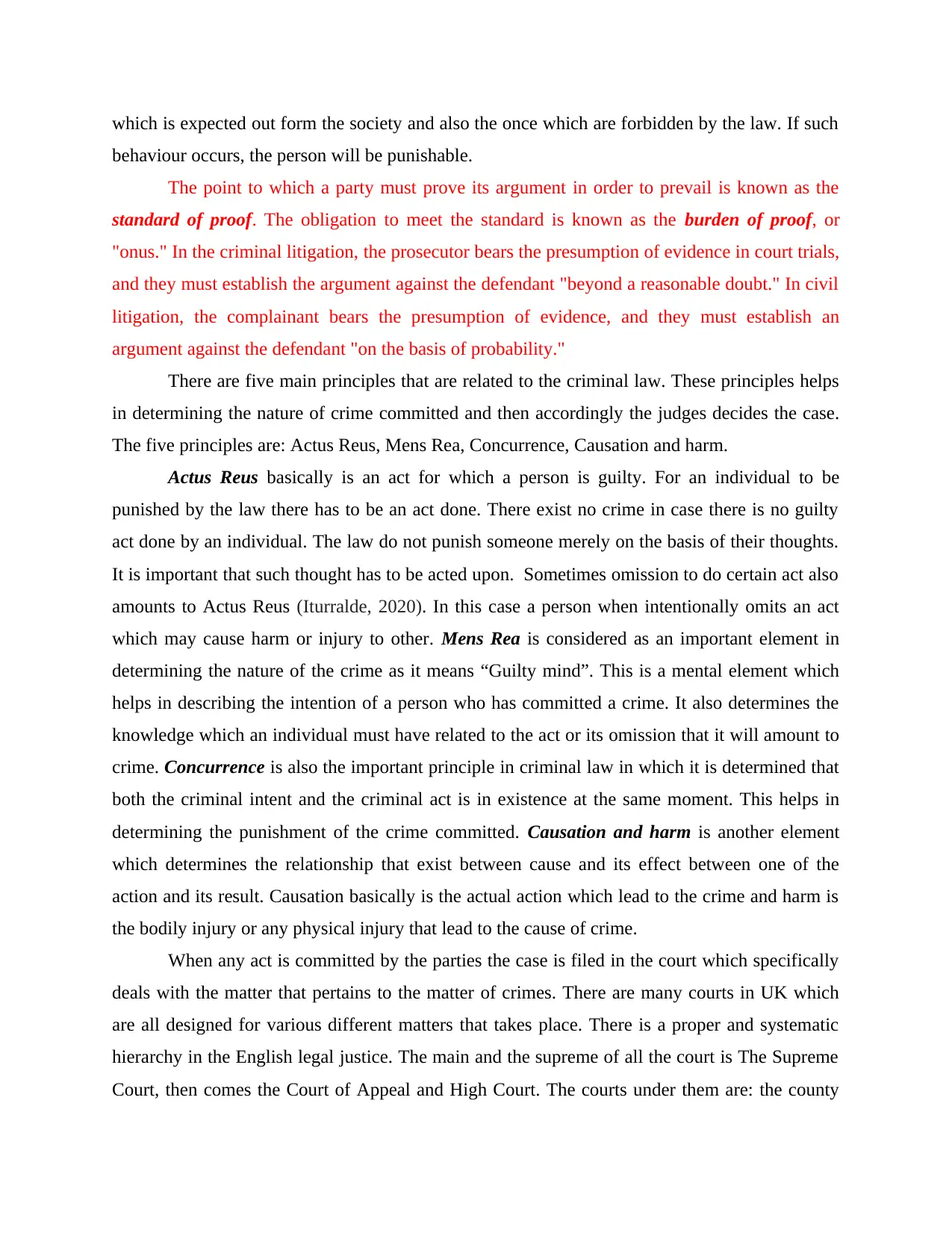
which is expected out form the society and also the once which are forbidden by the law. If such
behaviour occurs, the person will be punishable.
The point to which a party must prove its argument in order to prevail is known as the
standard of proof. The obligation to meet the standard is known as the burden of proof, or
"onus." In the criminal litigation, the prosecutor bears the presumption of evidence in court trials,
and they must establish the argument against the defendant "beyond a reasonable doubt." In civil
litigation, the complainant bears the presumption of evidence, and they must establish an
argument against the defendant "on the basis of probability."
There are five main principles that are related to the criminal law. These principles helps
in determining the nature of crime committed and then accordingly the judges decides the case.
The five principles are: Actus Reus, Mens Rea, Concurrence, Causation and harm.
Actus Reus basically is an act for which a person is guilty. For an individual to be
punished by the law there has to be an act done. There exist no crime in case there is no guilty
act done by an individual. The law do not punish someone merely on the basis of their thoughts.
It is important that such thought has to be acted upon. Sometimes omission to do certain act also
amounts to Actus Reus (Iturralde, 2020). In this case a person when intentionally omits an act
which may cause harm or injury to other. Mens Rea is considered as an important element in
determining the nature of the crime as it means “Guilty mind”. This is a mental element which
helps in describing the intention of a person who has committed a crime. It also determines the
knowledge which an individual must have related to the act or its omission that it will amount to
crime. Concurrence is also the important principle in criminal law in which it is determined that
both the criminal intent and the criminal act is in existence at the same moment. This helps in
determining the punishment of the crime committed. Causation and harm is another element
which determines the relationship that exist between cause and its effect between one of the
action and its result. Causation basically is the actual action which lead to the crime and harm is
the bodily injury or any physical injury that lead to the cause of crime.
When any act is committed by the parties the case is filed in the court which specifically
deals with the matter that pertains to the matter of crimes. There are many courts in UK which
are all designed for various different matters that takes place. There is a proper and systematic
hierarchy in the English legal justice. The main and the supreme of all the court is The Supreme
Court, then comes the Court of Appeal and High Court. The courts under them are: the county
behaviour occurs, the person will be punishable.
The point to which a party must prove its argument in order to prevail is known as the
standard of proof. The obligation to meet the standard is known as the burden of proof, or
"onus." In the criminal litigation, the prosecutor bears the presumption of evidence in court trials,
and they must establish the argument against the defendant "beyond a reasonable doubt." In civil
litigation, the complainant bears the presumption of evidence, and they must establish an
argument against the defendant "on the basis of probability."
There are five main principles that are related to the criminal law. These principles helps
in determining the nature of crime committed and then accordingly the judges decides the case.
The five principles are: Actus Reus, Mens Rea, Concurrence, Causation and harm.
Actus Reus basically is an act for which a person is guilty. For an individual to be
punished by the law there has to be an act done. There exist no crime in case there is no guilty
act done by an individual. The law do not punish someone merely on the basis of their thoughts.
It is important that such thought has to be acted upon. Sometimes omission to do certain act also
amounts to Actus Reus (Iturralde, 2020). In this case a person when intentionally omits an act
which may cause harm or injury to other. Mens Rea is considered as an important element in
determining the nature of the crime as it means “Guilty mind”. This is a mental element which
helps in describing the intention of a person who has committed a crime. It also determines the
knowledge which an individual must have related to the act or its omission that it will amount to
crime. Concurrence is also the important principle in criminal law in which it is determined that
both the criminal intent and the criminal act is in existence at the same moment. This helps in
determining the punishment of the crime committed. Causation and harm is another element
which determines the relationship that exist between cause and its effect between one of the
action and its result. Causation basically is the actual action which lead to the crime and harm is
the bodily injury or any physical injury that lead to the cause of crime.
When any act is committed by the parties the case is filed in the court which specifically
deals with the matter that pertains to the matter of crimes. There are many courts in UK which
are all designed for various different matters that takes place. There is a proper and systematic
hierarchy in the English legal justice. The main and the supreme of all the court is The Supreme
Court, then comes the Court of Appeal and High Court. The courts under them are: the county
Secure Best Marks with AI Grader
Need help grading? Try our AI Grader for instant feedback on your assignments.
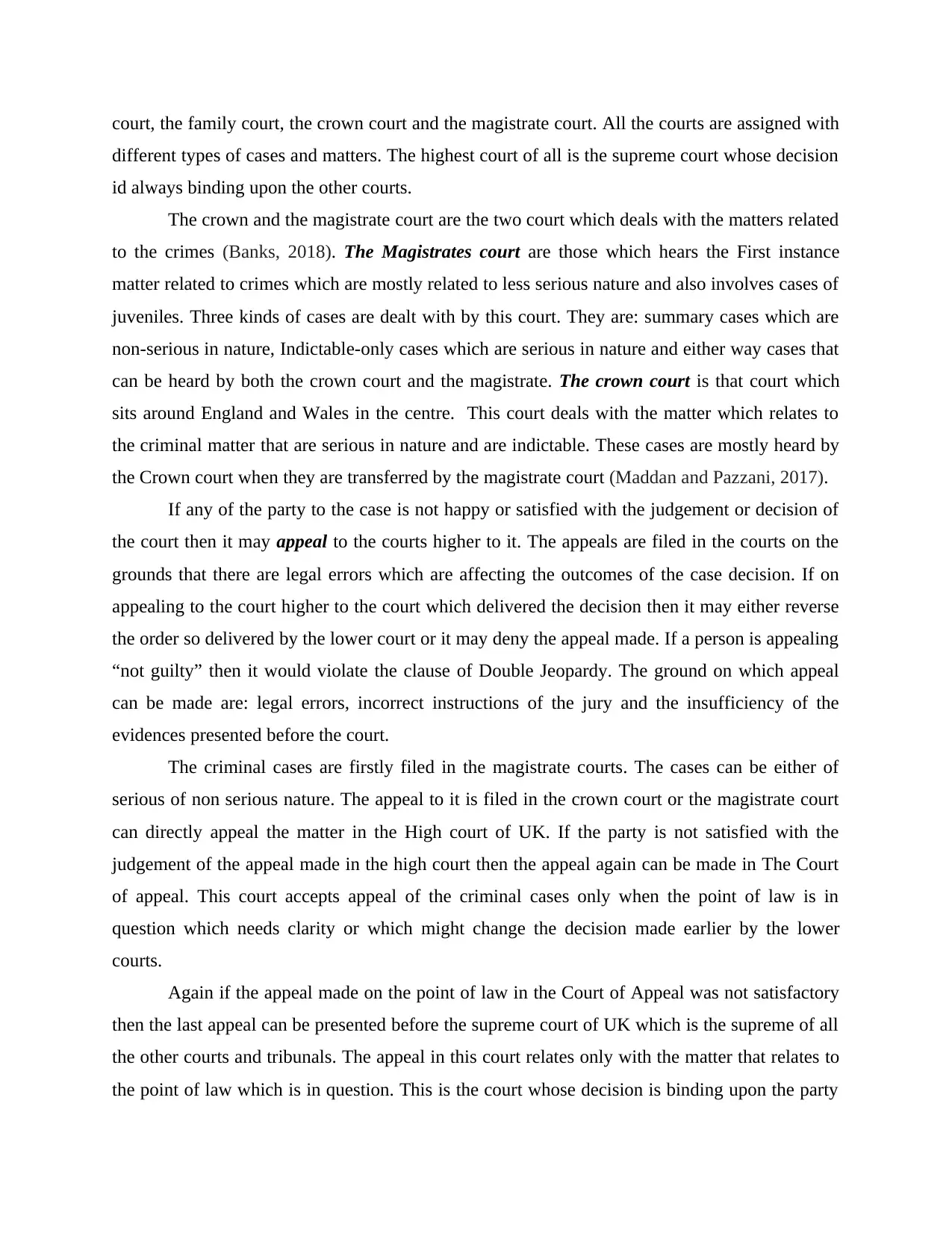
court, the family court, the crown court and the magistrate court. All the courts are assigned with
different types of cases and matters. The highest court of all is the supreme court whose decision
id always binding upon the other courts.
The crown and the magistrate court are the two court which deals with the matters related
to the crimes (Banks, 2018). The Magistrates court are those which hears the First instance
matter related to crimes which are mostly related to less serious nature and also involves cases of
juveniles. Three kinds of cases are dealt with by this court. They are: summary cases which are
non-serious in nature, Indictable-only cases which are serious in nature and either way cases that
can be heard by both the crown court and the magistrate. The crown court is that court which
sits around England and Wales in the centre. This court deals with the matter which relates to
the criminal matter that are serious in nature and are indictable. These cases are mostly heard by
the Crown court when they are transferred by the magistrate court (Maddan and Pazzani, 2017).
If any of the party to the case is not happy or satisfied with the judgement or decision of
the court then it may appeal to the courts higher to it. The appeals are filed in the courts on the
grounds that there are legal errors which are affecting the outcomes of the case decision. If on
appealing to the court higher to the court which delivered the decision then it may either reverse
the order so delivered by the lower court or it may deny the appeal made. If a person is appealing
“not guilty” then it would violate the clause of Double Jeopardy. The ground on which appeal
can be made are: legal errors, incorrect instructions of the jury and the insufficiency of the
evidences presented before the court.
The criminal cases are firstly filed in the magistrate courts. The cases can be either of
serious of non serious nature. The appeal to it is filed in the crown court or the magistrate court
can directly appeal the matter in the High court of UK. If the party is not satisfied with the
judgement of the appeal made in the high court then the appeal again can be made in The Court
of appeal. This court accepts appeal of the criminal cases only when the point of law is in
question which needs clarity or which might change the decision made earlier by the lower
courts.
Again if the appeal made on the point of law in the Court of Appeal was not satisfactory
then the last appeal can be presented before the supreme court of UK which is the supreme of all
the other courts and tribunals. The appeal in this court relates only with the matter that relates to
the point of law which is in question. This is the court whose decision is binding upon the party
different types of cases and matters. The highest court of all is the supreme court whose decision
id always binding upon the other courts.
The crown and the magistrate court are the two court which deals with the matters related
to the crimes (Banks, 2018). The Magistrates court are those which hears the First instance
matter related to crimes which are mostly related to less serious nature and also involves cases of
juveniles. Three kinds of cases are dealt with by this court. They are: summary cases which are
non-serious in nature, Indictable-only cases which are serious in nature and either way cases that
can be heard by both the crown court and the magistrate. The crown court is that court which
sits around England and Wales in the centre. This court deals with the matter which relates to
the criminal matter that are serious in nature and are indictable. These cases are mostly heard by
the Crown court when they are transferred by the magistrate court (Maddan and Pazzani, 2017).
If any of the party to the case is not happy or satisfied with the judgement or decision of
the court then it may appeal to the courts higher to it. The appeals are filed in the courts on the
grounds that there are legal errors which are affecting the outcomes of the case decision. If on
appealing to the court higher to the court which delivered the decision then it may either reverse
the order so delivered by the lower court or it may deny the appeal made. If a person is appealing
“not guilty” then it would violate the clause of Double Jeopardy. The ground on which appeal
can be made are: legal errors, incorrect instructions of the jury and the insufficiency of the
evidences presented before the court.
The criminal cases are firstly filed in the magistrate courts. The cases can be either of
serious of non serious nature. The appeal to it is filed in the crown court or the magistrate court
can directly appeal the matter in the High court of UK. If the party is not satisfied with the
judgement of the appeal made in the high court then the appeal again can be made in The Court
of appeal. This court accepts appeal of the criminal cases only when the point of law is in
question which needs clarity or which might change the decision made earlier by the lower
courts.
Again if the appeal made on the point of law in the Court of Appeal was not satisfactory
then the last appeal can be presented before the supreme court of UK which is the supreme of all
the other courts and tribunals. The appeal in this court relates only with the matter that relates to
the point of law which is in question. This is the court whose decision is binding upon the party
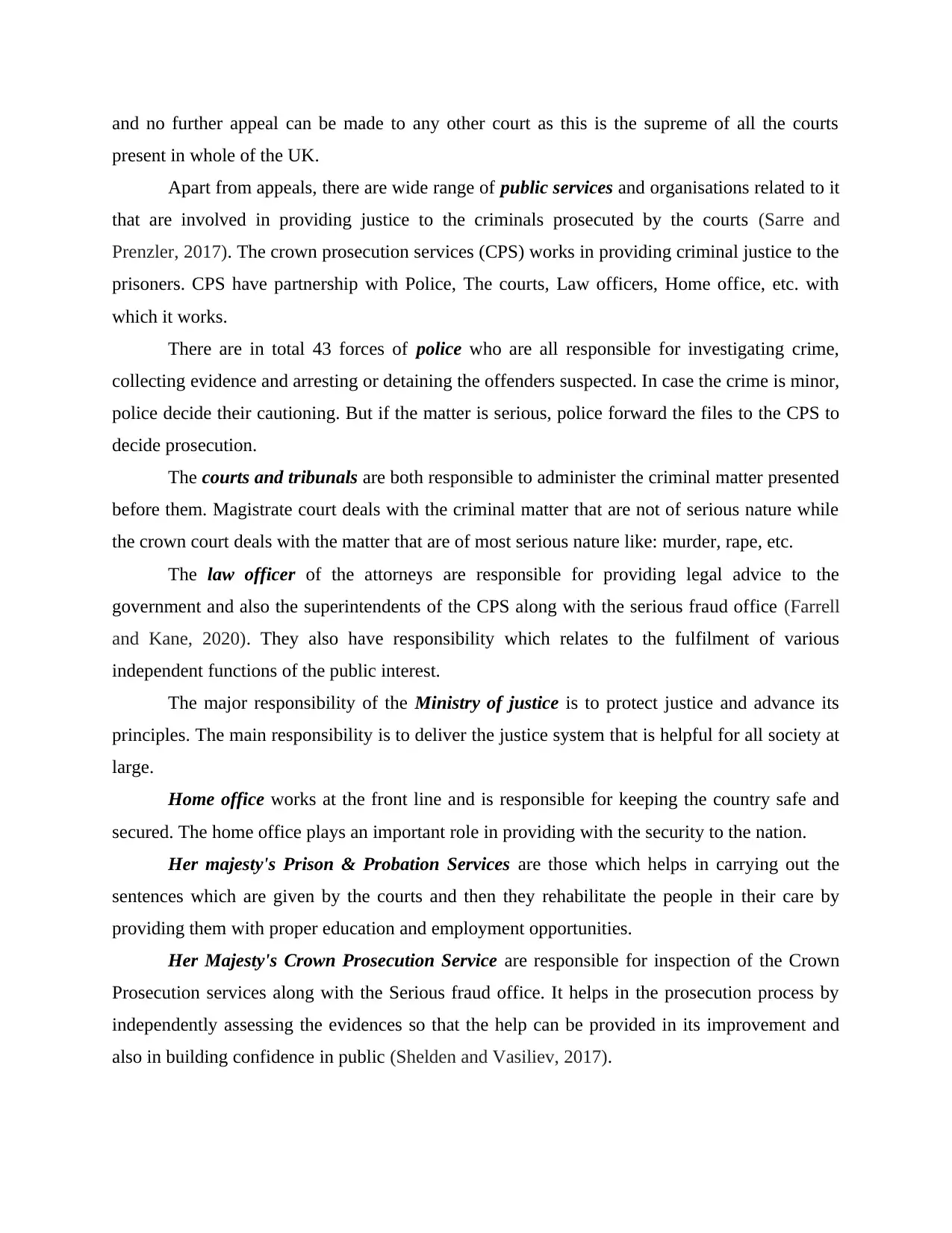
and no further appeal can be made to any other court as this is the supreme of all the courts
present in whole of the UK.
Apart from appeals, there are wide range of public services and organisations related to it
that are involved in providing justice to the criminals prosecuted by the courts (Sarre and
Prenzler, 2017). The crown prosecution services (CPS) works in providing criminal justice to the
prisoners. CPS have partnership with Police, The courts, Law officers, Home office, etc. with
which it works.
There are in total 43 forces of police who are all responsible for investigating crime,
collecting evidence and arresting or detaining the offenders suspected. In case the crime is minor,
police decide their cautioning. But if the matter is serious, police forward the files to the CPS to
decide prosecution.
The courts and tribunals are both responsible to administer the criminal matter presented
before them. Magistrate court deals with the criminal matter that are not of serious nature while
the crown court deals with the matter that are of most serious nature like: murder, rape, etc.
The law officer of the attorneys are responsible for providing legal advice to the
government and also the superintendents of the CPS along with the serious fraud office (Farrell
and Kane, 2020). They also have responsibility which relates to the fulfilment of various
independent functions of the public interest.
The major responsibility of the Ministry of justice is to protect justice and advance its
principles. The main responsibility is to deliver the justice system that is helpful for all society at
large.
Home office works at the front line and is responsible for keeping the country safe and
secured. The home office plays an important role in providing with the security to the nation.
Her majesty's Prison & Probation Services are those which helps in carrying out the
sentences which are given by the courts and then they rehabilitate the people in their care by
providing them with proper education and employment opportunities.
Her Majesty's Crown Prosecution Service are responsible for inspection of the Crown
Prosecution services along with the Serious fraud office. It helps in the prosecution process by
independently assessing the evidences so that the help can be provided in its improvement and
also in building confidence in public (Shelden and Vasiliev, 2017).
present in whole of the UK.
Apart from appeals, there are wide range of public services and organisations related to it
that are involved in providing justice to the criminals prosecuted by the courts (Sarre and
Prenzler, 2017). The crown prosecution services (CPS) works in providing criminal justice to the
prisoners. CPS have partnership with Police, The courts, Law officers, Home office, etc. with
which it works.
There are in total 43 forces of police who are all responsible for investigating crime,
collecting evidence and arresting or detaining the offenders suspected. In case the crime is minor,
police decide their cautioning. But if the matter is serious, police forward the files to the CPS to
decide prosecution.
The courts and tribunals are both responsible to administer the criminal matter presented
before them. Magistrate court deals with the criminal matter that are not of serious nature while
the crown court deals with the matter that are of most serious nature like: murder, rape, etc.
The law officer of the attorneys are responsible for providing legal advice to the
government and also the superintendents of the CPS along with the serious fraud office (Farrell
and Kane, 2020). They also have responsibility which relates to the fulfilment of various
independent functions of the public interest.
The major responsibility of the Ministry of justice is to protect justice and advance its
principles. The main responsibility is to deliver the justice system that is helpful for all society at
large.
Home office works at the front line and is responsible for keeping the country safe and
secured. The home office plays an important role in providing with the security to the nation.
Her majesty's Prison & Probation Services are those which helps in carrying out the
sentences which are given by the courts and then they rehabilitate the people in their care by
providing them with proper education and employment opportunities.
Her Majesty's Crown Prosecution Service are responsible for inspection of the Crown
Prosecution services along with the Serious fraud office. It helps in the prosecution process by
independently assessing the evidences so that the help can be provided in its improvement and
also in building confidence in public (Shelden and Vasiliev, 2017).
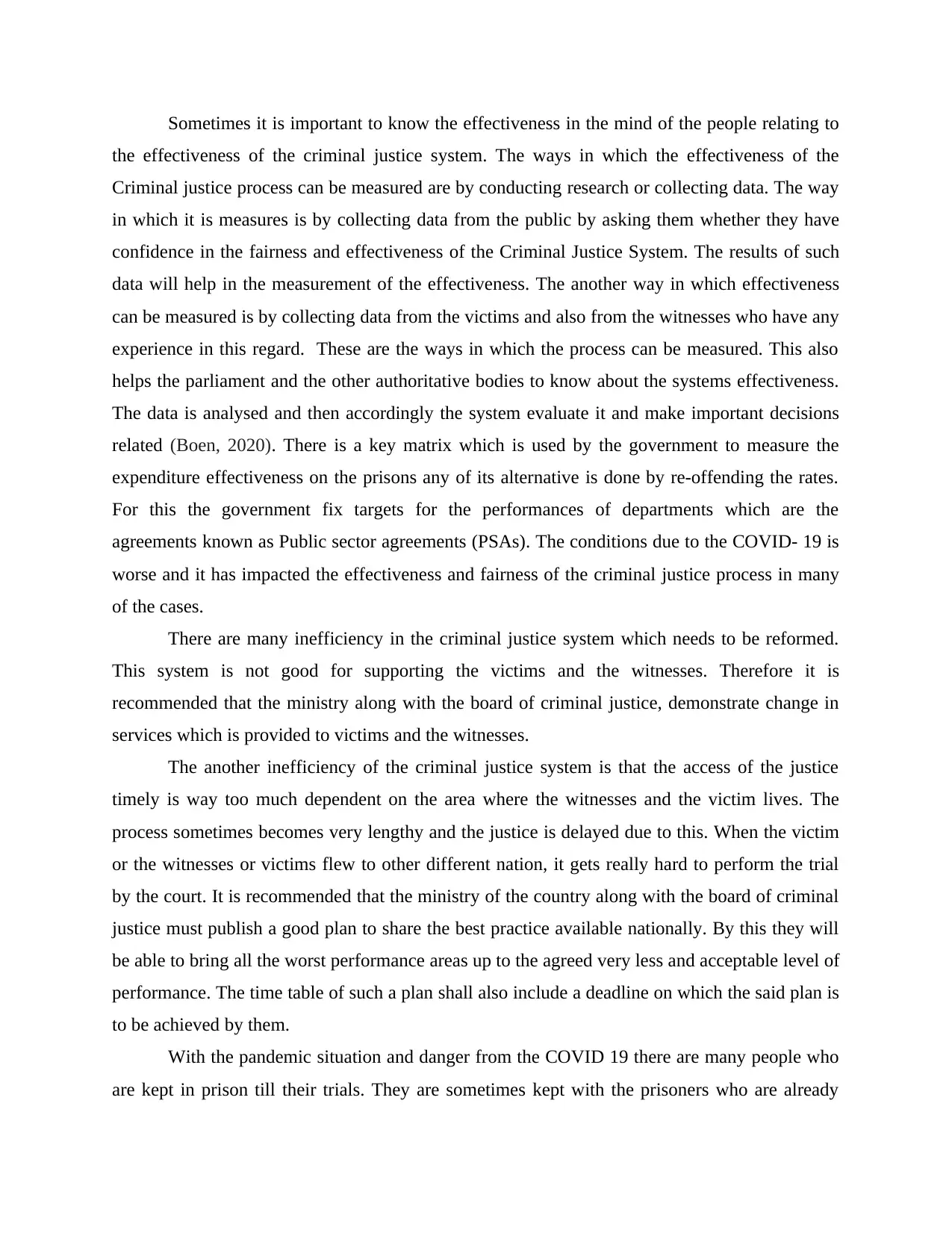
Sometimes it is important to know the effectiveness in the mind of the people relating to
the effectiveness of the criminal justice system. The ways in which the effectiveness of the
Criminal justice process can be measured are by conducting research or collecting data. The way
in which it is measures is by collecting data from the public by asking them whether they have
confidence in the fairness and effectiveness of the Criminal Justice System. The results of such
data will help in the measurement of the effectiveness. The another way in which effectiveness
can be measured is by collecting data from the victims and also from the witnesses who have any
experience in this regard. These are the ways in which the process can be measured. This also
helps the parliament and the other authoritative bodies to know about the systems effectiveness.
The data is analysed and then accordingly the system evaluate it and make important decisions
related (Boen, 2020). There is a key matrix which is used by the government to measure the
expenditure effectiveness on the prisons any of its alternative is done by re-offending the rates.
For this the government fix targets for the performances of departments which are the
agreements known as Public sector agreements (PSAs). The conditions due to the COVID- 19 is
worse and it has impacted the effectiveness and fairness of the criminal justice process in many
of the cases.
There are many inefficiency in the criminal justice system which needs to be reformed.
This system is not good for supporting the victims and the witnesses. Therefore it is
recommended that the ministry along with the board of criminal justice, demonstrate change in
services which is provided to victims and the witnesses.
The another inefficiency of the criminal justice system is that the access of the justice
timely is way too much dependent on the area where the witnesses and the victim lives. The
process sometimes becomes very lengthy and the justice is delayed due to this. When the victim
or the witnesses or victims flew to other different nation, it gets really hard to perform the trial
by the court. It is recommended that the ministry of the country along with the board of criminal
justice must publish a good plan to share the best practice available nationally. By this they will
be able to bring all the worst performance areas up to the agreed very less and acceptable level of
performance. The time table of such a plan shall also include a deadline on which the said plan is
to be achieved by them.
With the pandemic situation and danger from the COVID 19 there are many people who
are kept in prison till their trials. They are sometimes kept with the prisoners who are already
the effectiveness of the criminal justice system. The ways in which the effectiveness of the
Criminal justice process can be measured are by conducting research or collecting data. The way
in which it is measures is by collecting data from the public by asking them whether they have
confidence in the fairness and effectiveness of the Criminal Justice System. The results of such
data will help in the measurement of the effectiveness. The another way in which effectiveness
can be measured is by collecting data from the victims and also from the witnesses who have any
experience in this regard. These are the ways in which the process can be measured. This also
helps the parliament and the other authoritative bodies to know about the systems effectiveness.
The data is analysed and then accordingly the system evaluate it and make important decisions
related (Boen, 2020). There is a key matrix which is used by the government to measure the
expenditure effectiveness on the prisons any of its alternative is done by re-offending the rates.
For this the government fix targets for the performances of departments which are the
agreements known as Public sector agreements (PSAs). The conditions due to the COVID- 19 is
worse and it has impacted the effectiveness and fairness of the criminal justice process in many
of the cases.
There are many inefficiency in the criminal justice system which needs to be reformed.
This system is not good for supporting the victims and the witnesses. Therefore it is
recommended that the ministry along with the board of criminal justice, demonstrate change in
services which is provided to victims and the witnesses.
The another inefficiency of the criminal justice system is that the access of the justice
timely is way too much dependent on the area where the witnesses and the victim lives. The
process sometimes becomes very lengthy and the justice is delayed due to this. When the victim
or the witnesses or victims flew to other different nation, it gets really hard to perform the trial
by the court. It is recommended that the ministry of the country along with the board of criminal
justice must publish a good plan to share the best practice available nationally. By this they will
be able to bring all the worst performance areas up to the agreed very less and acceptable level of
performance. The time table of such a plan shall also include a deadline on which the said plan is
to be achieved by them.
With the pandemic situation and danger from the COVID 19 there are many people who
are kept in prison till their trials. They are sometimes kept with the prisoners who are already
Paraphrase This Document
Need a fresh take? Get an instant paraphrase of this document with our AI Paraphraser
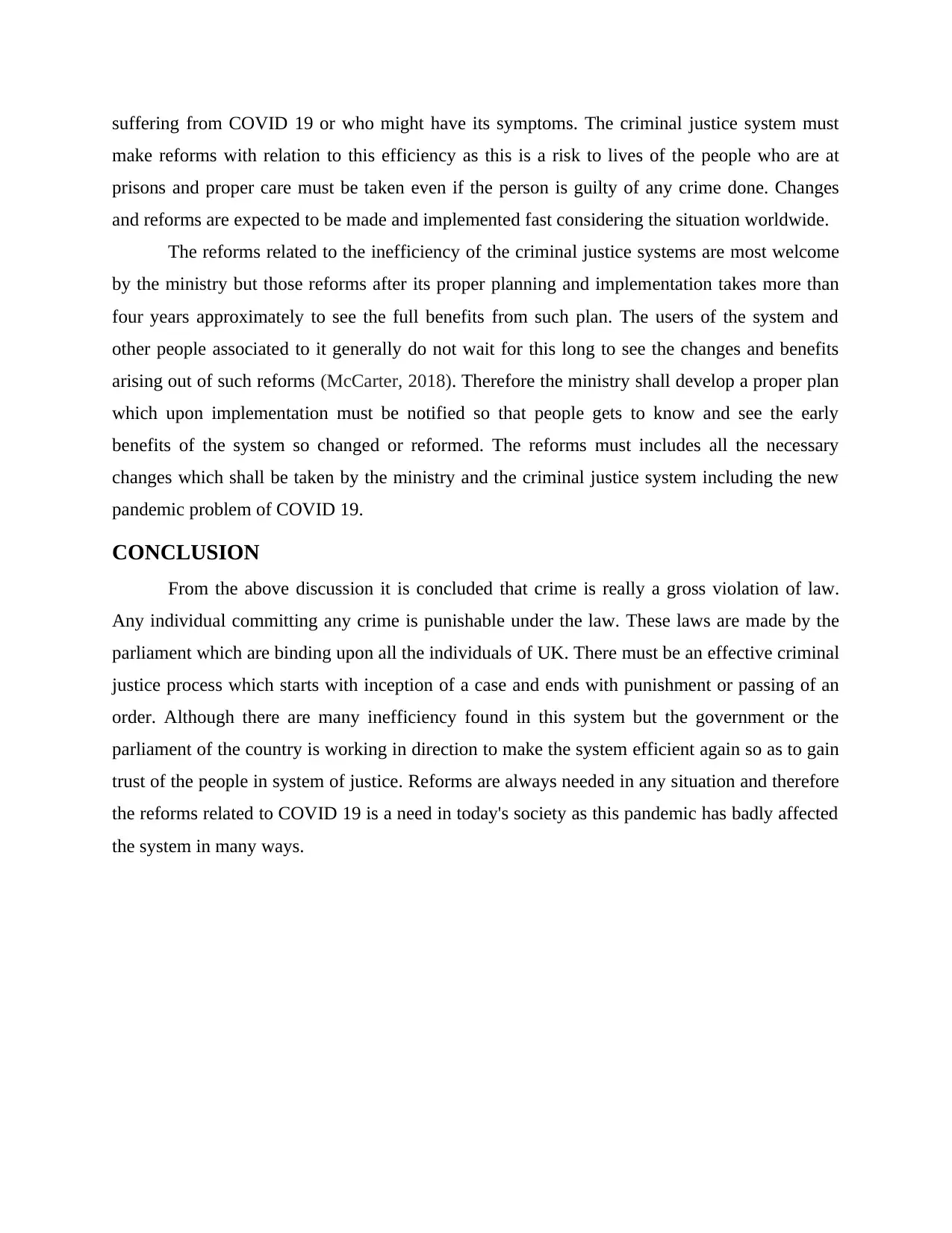
suffering from COVID 19 or who might have its symptoms. The criminal justice system must
make reforms with relation to this efficiency as this is a risk to lives of the people who are at
prisons and proper care must be taken even if the person is guilty of any crime done. Changes
and reforms are expected to be made and implemented fast considering the situation worldwide.
The reforms related to the inefficiency of the criminal justice systems are most welcome
by the ministry but those reforms after its proper planning and implementation takes more than
four years approximately to see the full benefits from such plan. The users of the system and
other people associated to it generally do not wait for this long to see the changes and benefits
arising out of such reforms (McCarter, 2018). Therefore the ministry shall develop a proper plan
which upon implementation must be notified so that people gets to know and see the early
benefits of the system so changed or reformed. The reforms must includes all the necessary
changes which shall be taken by the ministry and the criminal justice system including the new
pandemic problem of COVID 19.
CONCLUSION
From the above discussion it is concluded that crime is really a gross violation of law.
Any individual committing any crime is punishable under the law. These laws are made by the
parliament which are binding upon all the individuals of UK. There must be an effective criminal
justice process which starts with inception of a case and ends with punishment or passing of an
order. Although there are many inefficiency found in this system but the government or the
parliament of the country is working in direction to make the system efficient again so as to gain
trust of the people in system of justice. Reforms are always needed in any situation and therefore
the reforms related to COVID 19 is a need in today's society as this pandemic has badly affected
the system in many ways.
make reforms with relation to this efficiency as this is a risk to lives of the people who are at
prisons and proper care must be taken even if the person is guilty of any crime done. Changes
and reforms are expected to be made and implemented fast considering the situation worldwide.
The reforms related to the inefficiency of the criminal justice systems are most welcome
by the ministry but those reforms after its proper planning and implementation takes more than
four years approximately to see the full benefits from such plan. The users of the system and
other people associated to it generally do not wait for this long to see the changes and benefits
arising out of such reforms (McCarter, 2018). Therefore the ministry shall develop a proper plan
which upon implementation must be notified so that people gets to know and see the early
benefits of the system so changed or reformed. The reforms must includes all the necessary
changes which shall be taken by the ministry and the criminal justice system including the new
pandemic problem of COVID 19.
CONCLUSION
From the above discussion it is concluded that crime is really a gross violation of law.
Any individual committing any crime is punishable under the law. These laws are made by the
parliament which are binding upon all the individuals of UK. There must be an effective criminal
justice process which starts with inception of a case and ends with punishment or passing of an
order. Although there are many inefficiency found in this system but the government or the
parliament of the country is working in direction to make the system efficient again so as to gain
trust of the people in system of justice. Reforms are always needed in any situation and therefore
the reforms related to COVID 19 is a need in today's society as this pandemic has badly affected
the system in many ways.
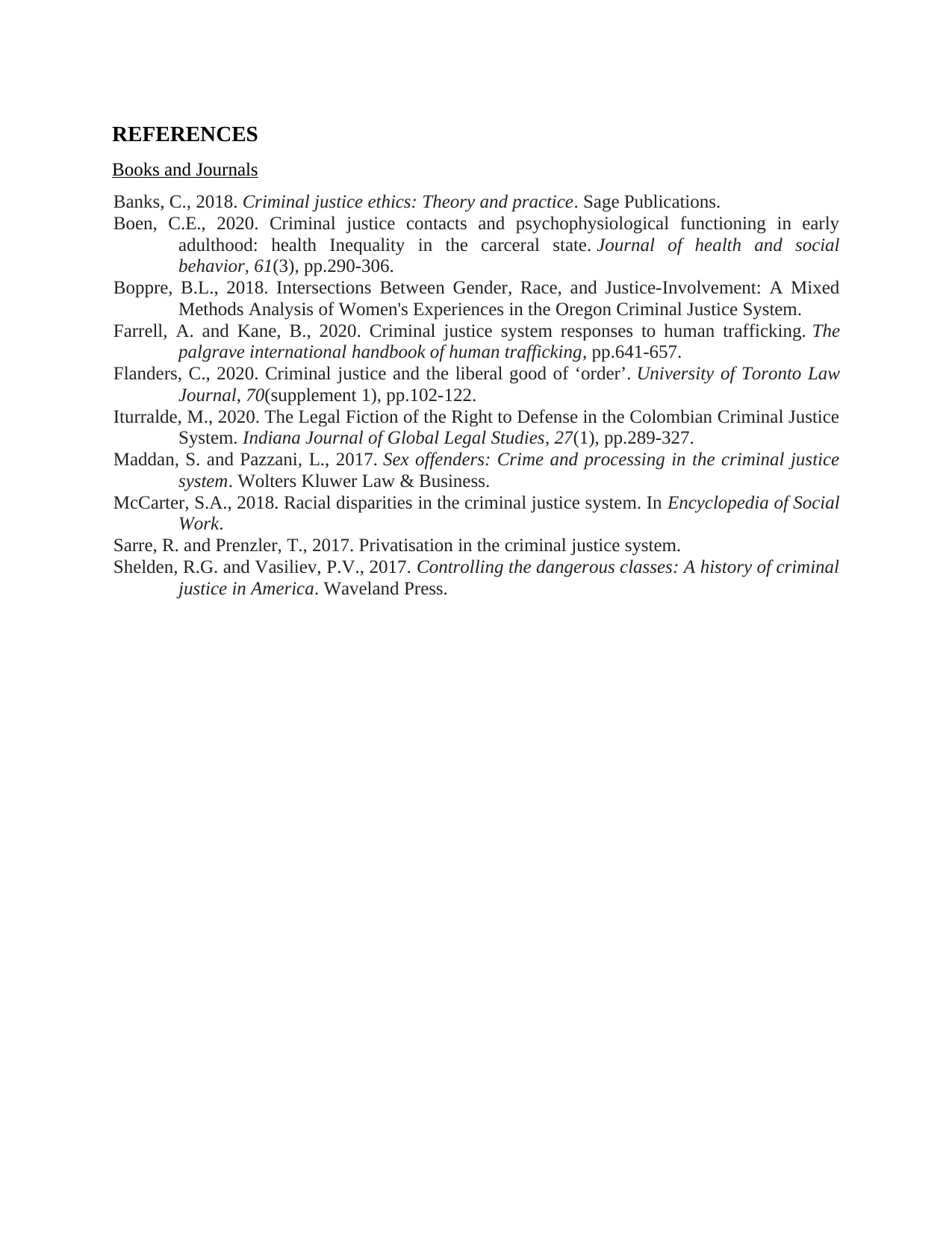
REFERENCES
Books and Journals
Banks, C., 2018. Criminal justice ethics: Theory and practice. Sage Publications.
Boen, C.E., 2020. Criminal justice contacts and psychophysiological functioning in early
adulthood: health Inequality in the carceral state. Journal of health and social
behavior, 61(3), pp.290-306.
Boppre, B.L., 2018. Intersections Between Gender, Race, and Justice-Involvement: A Mixed
Methods Analysis of Women's Experiences in the Oregon Criminal Justice System.
Farrell, A. and Kane, B., 2020. Criminal justice system responses to human trafficking. The
palgrave international handbook of human trafficking, pp.641-657.
Flanders, C., 2020. Criminal justice and the liberal good of ‘order’. University of Toronto Law
Journal, 70(supplement 1), pp.102-122.
Iturralde, M., 2020. The Legal Fiction of the Right to Defense in the Colombian Criminal Justice
System. Indiana Journal of Global Legal Studies, 27(1), pp.289-327.
Maddan, S. and Pazzani, L., 2017. Sex offenders: Crime and processing in the criminal justice
system. Wolters Kluwer Law & Business.
McCarter, S.A., 2018. Racial disparities in the criminal justice system. In Encyclopedia of Social
Work.
Sarre, R. and Prenzler, T., 2017. Privatisation in the criminal justice system.
Shelden, R.G. and Vasiliev, P.V., 2017. Controlling the dangerous classes: A history of criminal
justice in America. Waveland Press.
Books and Journals
Banks, C., 2018. Criminal justice ethics: Theory and practice. Sage Publications.
Boen, C.E., 2020. Criminal justice contacts and psychophysiological functioning in early
adulthood: health Inequality in the carceral state. Journal of health and social
behavior, 61(3), pp.290-306.
Boppre, B.L., 2018. Intersections Between Gender, Race, and Justice-Involvement: A Mixed
Methods Analysis of Women's Experiences in the Oregon Criminal Justice System.
Farrell, A. and Kane, B., 2020. Criminal justice system responses to human trafficking. The
palgrave international handbook of human trafficking, pp.641-657.
Flanders, C., 2020. Criminal justice and the liberal good of ‘order’. University of Toronto Law
Journal, 70(supplement 1), pp.102-122.
Iturralde, M., 2020. The Legal Fiction of the Right to Defense in the Colombian Criminal Justice
System. Indiana Journal of Global Legal Studies, 27(1), pp.289-327.
Maddan, S. and Pazzani, L., 2017. Sex offenders: Crime and processing in the criminal justice
system. Wolters Kluwer Law & Business.
McCarter, S.A., 2018. Racial disparities in the criminal justice system. In Encyclopedia of Social
Work.
Sarre, R. and Prenzler, T., 2017. Privatisation in the criminal justice system.
Shelden, R.G. and Vasiliev, P.V., 2017. Controlling the dangerous classes: A history of criminal
justice in America. Waveland Press.
1 out of 9
Related Documents
Your All-in-One AI-Powered Toolkit for Academic Success.
+13062052269
info@desklib.com
Available 24*7 on WhatsApp / Email
![[object Object]](/_next/static/media/star-bottom.7253800d.svg)
Unlock your academic potential
© 2024 | Zucol Services PVT LTD | All rights reserved.





